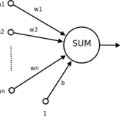A remarkable capacity of the brain is its ability to autonomously reorganize memories during offline periods. Memory replay, a mechanism hypothesized to underlie biological offline learning, has inspired offline methods for reducing forgetting in artificial neural networks in continual learning settings. A memory-efficient and neurally-plausible method is generative replay, which achieves state of the art performance on continual learning benchmarks. However, unlike the brain, standard generative replay does not self-reorganize memories when trained offline on its own replay samples. We propose a novel architecture that augments generative replay with an adaptive, brain-like capacity to autonomously recover memories. We demonstrate this capacity of the architecture across several continual learning tasks and environments.
翻译:大脑的非凡能力在于它有能力在离线期间自主重组记忆。 记忆回放是生物离线学习的一种假设机制,它激发了在持续学习环境中减少人工神经网络中遗忘的离线方法。 记忆高效和神经可变的方法是基因回放,在持续学习的基准上实现了艺术表现的状态。 但是,与大脑不同,标准重现不会在自线回放样本上训练时使记忆自我再组织。 我们提出一个新的结构,用适应性、像大脑一样的能力增强基因回放,以自动恢复记忆。 我们展示了建筑在不断学习的任务和环境中的这种能力。
相关内容
Source: Apple - iOS 8



